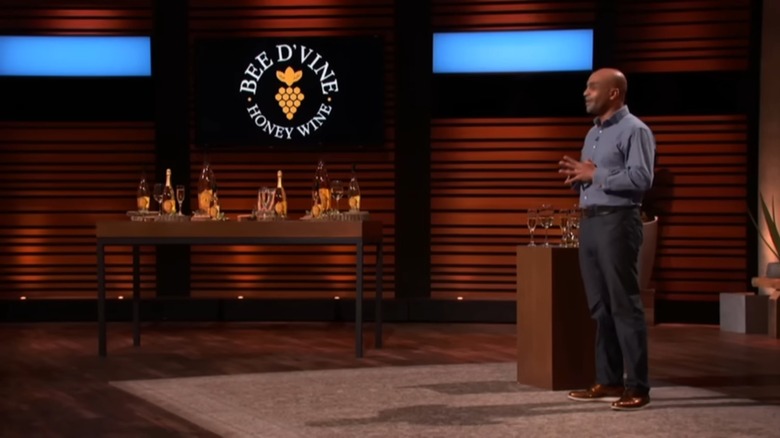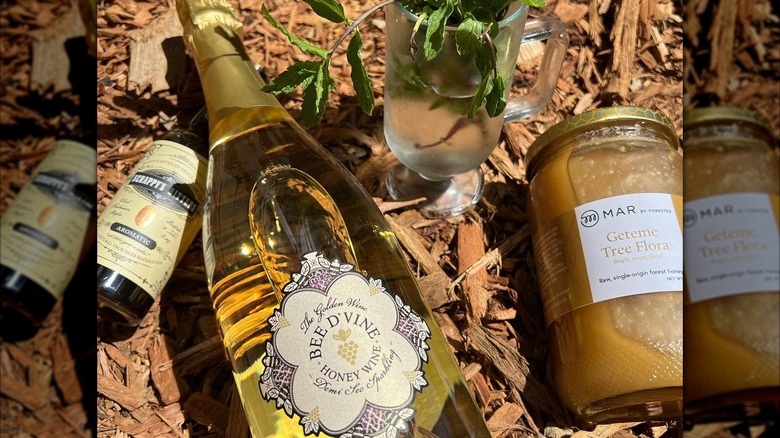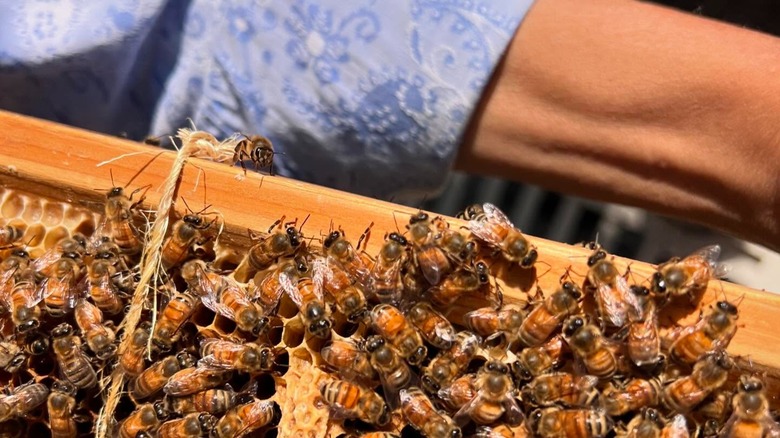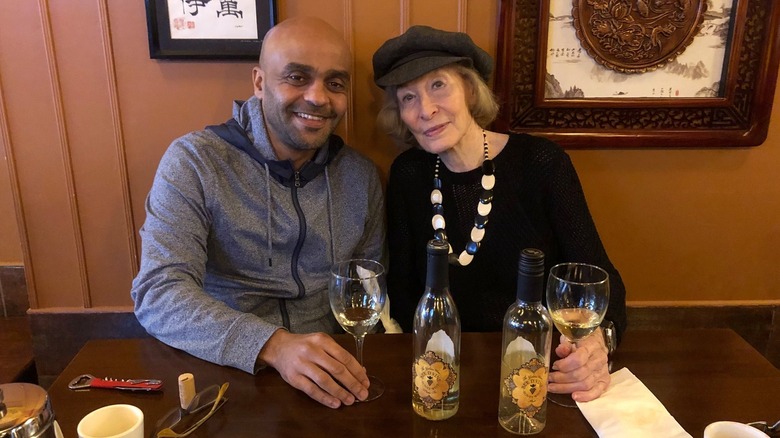Bee D'Vine: Here's What Happened After Appearing On Shark Tank
Ayele Solomon built The Honey Wine Company and its product line, Bee D'Vine Honey Wine, off a passionate combination of expertise and heritage. Solomon was born in Ethiopia, where there is a rich tradition of drinking t'ej, or honey wine. Also known as mead, this wine is the world's oldest alcoholic beverage. Mead is different from wine in that it is fermented from honey and not grapes. All wine has at least some sugar content, but honey wine is known for being sweet enough to sip alongside dessert. As an adult living in Sonoma, California, the heart of wine country, Solomon envisioned a small-batch winery that would bring sweet, enjoyable honey wine to the masses while incorporating sustainable practices that would safeguard native endangered honeybees. Just two ingredients went into every bottle of Bee D'Vine: local raw honey and pure spring water.
By the time Solomon appeared on Season 12 of "Shark Tank," he'd had some success building his company, but only to a modest degree. His philosophy of keeping the business small with high margins had seen him only having done $400,000 in sales over the previous six years, a figure that shocked the sharks. Tasting his wares, which included both still and sparkling wines, the sharks unanimously agreed that the wine was delicious and a product that people would want to try. But, would Solomon be open to making the changes necessary to break through and bring Bee D'Vine to the big time?
What happened to Bee D'Vine on Shark Tank?
Solomon buzzed into the "Shark Tank" seeking a $750,000 investment in exchange for 25% equity in his company. The sharks were highly enthused by the wine. Lori Greiner, in particular, said that it was something she would enjoy drinking on a regular basis. Concerns popped up immediately when Solomon talked numbers, however. Mark Cuban was baffled as to why Solomon was charging $40–50 for a bottle of wine that only cost $5.93 to produce. Shark Kevin O'Leary, who already has a hand in a wine empire, pointed out that a full 97% of American wine sales are on bottles under $14. As Solomon tried to defend his business model, four of the five sharks (minus O'Leary) came up with a novel plan.
In a rare and exciting offer, Cuban, Greiner, Robert Herjavec, and Daniel Lubetzky joined forces and offered Solomon his asked-for investment of $750,000 in exchange for a 40% share in Bee D'Vine — 10% for each shark involved. Solomon tried to counter the deal, but Cuban, with his trademark assertiveness, told him that there would be no compromise. Ultimately, Solomon agreed to the terms, and the whole room celebrated with a toast of honey wine.
Bee D'Vine After Shark Tank
Right after airing, Bee D'Vine was subject to the infamous "Shark Tank effect," in which tremendous interest by the viewing public is funneled to their product. As per Bee D'Vine's Facebook comments, the winery's website crashed shortly after the episode due to an abundance of clicks. There were also some persistent complaints about orders not arriving on time and poor communication from the company, which may have something to do with the fact that, ultimately, Bee D'Vine's success flourished while the company kept production small. Fascinatingly, for reasons that were not disclosed, the four-shark investment deal on Bee D'Vine was never completed. LinkedIn mentions that, even today, the company only has 2-10 employees. It may have been initially overwhelmed, but that didn't seem to stop Bee D'Vine's upward trajectory.
Solomon quickly partnered with Ethiopian Airlines to have Bee D'Vine served on their flights. Honey wine is very sweet, and customers responded favorably to Bee D'Vine's product. The company also partnered with The Sip to craft a special gift box to introduce honey wine to the uninitiated. Bee D'Vine struggled initially to match production with demand and sold out of its entire inventory, but it quickly replenished stock.
Is Bee D'Vine still in business?
Today, Bee D'Vine gives every impression of thriving. Solomon stuck to his guns and maintained the small scale of the business with premium pricing on the wines. As mentioned, Bee D'Vine has few employees. Its Facebook boasts just 3,000 followers, along with over 5,000 on Instagram, where Bee D'Vine showcases beautifully shot images of its honeybees hard at work and its gorgeous, golden-hued bottles of wine. Recently, a holiday sale offered a generous 30% off any single bottles of honey wine, which are still selling on Bee D'Vine's website for $50–$70 — the premium price point that the sharks disliked when Solomon was on the show. You can also find Bee D'Vine at select California outlets of Total Wine & More.
Bee D'Vine also offers a Club D'Vine subscription service. In exchange for committing to a shipment of at least four bottles a month, subscribers receive free shipping, a pair of berelé sipping flasks, a bottle of red wine vinegar, and a free copy of Solomon's book, "The Celebrated Story of Honey Wine." Wine club subscriptions are not only great ways of scoring perks for oenophiles, but they make excellent gifts. The ability to customize your monthly shipment with Club D'Vine is a huge selling point, as many subscriptions don't give you a choice.
What's next for Bee D'Vine?
Bee D'Vine has won a laundry list of awards for its semi-sweet and dry wines. But, Solomon isn't content to rest on his laurels. He told Wine Spectator that he envisions the future of Bee D'Vine in testing wine made from global honey varietals. Given his biography, it's not surprising that he wants to try crafting a wine from Ethiopian honey. Overall, Solomon's plan is to continue spreading the gospel of honey wine to the world. In his opinion, the fact that honey wine doesn't have the tannins of grape wine makes it a better and more versatile pairing for food and a naturally superior product. As more people try Bee D'Vine, he feels, they will taste the difference.
Despite having a strong affinity for honey wine, The Honey Wine Company has recently broken into experimenting with the production of sweet red wines. Solomon is also pushing boundaries as an authority on cooking with honey wine in a section in his book — apparently, mead pairs naturally with fish, chicken, and cream-based pasta dishes. In 2024, Bee D'Vine posted a nostalgic and optimistic blog post looking back on a decade in business. "What seems bad is almost always extremely good (or not as bad as it seems)," the company reflected. Was this a reflection on the failed "Shark Tank" deal? It's not made explicit, but it's clear that the maxim held true for Bee D'Vine's TV experience.




